
by Eron Henry | Nov 15, 2024 | Uncategorized
Dear Lott Carey Family,
As we approach Giving Tuesday on December 3, 2024, we are reminded of the incredible impact we can make when we come together in support of a common cause. This year, we are focusing our efforts on supporting vital medical initiatives for our partners in Guyana, India, Ethiopia, Kenya, and Liberia.
Lott Carey has a long-standing commitment to providing essential healthcare services to communities in need. Our initiatives include:
- Free medical care for leprosy patients in India
- HIV/AIDS education, prevention, care, and support in Ethiopia
- Medical supplies for the Kipsitet Medical Center in Kenya
- Healthcare services in Guyana
- Support for medical initiatives in Liberia
These programs are crucial in addressing the healthcare disparities faced by these communities. With your generous support, we can continue to provide life-saving medical care and education to those who need it most.
How You Can Help:
- Donate: Your financial contributions are essential. Every dollar you give helps us provide critical medical services and supplies.
- Spread the Word: Share our mission with your friends, family, and social networks. The more people who know about our cause, the greater our impact.
- Volunteer: If you have medical expertise or other skills, consider volunteering your time to support our initiatives.
Why Your Support Matters
Your donations directly impact the lives of individuals and families in these countries. For example, in India, your support helps us provide free medical care to leprosy patients, offering them hope and dignity. In Ethiopia, your contributions fund HIV/AIDS education and care, empowering communities to combat this devastating disease.
Join Us This Giving Tuesday
On December 3, we invite you to join us in making a difference. Together, we can ensure that our partners in Guyana, India, Ethiopia, Kenya, and Liberia receive the medical care they desperately need. Your generosity can transform lives and bring hope to those who need it most.
Thank you for your continued support and commitment to our mission. Let’s make this Giving Tuesday our most impactful yet!
With gratitude,
Emmett L. Dunn
Executive Secretary-Treasurer
Lott Carey

by Eron Henry | Oct 18, 2024 | News
In the wake of the devastating Hurricanes Helene and Milton, Lott Carey is urgently appealing for donations to support disaster relief efforts. These powerful storms have left a trail of destruction across the southeastern United States, affecting countless lives and communities.
Hurricane Helene made landfall on September 26, in Florida’s Big Bend region as a Category 4 storm with winds reaching 140 mph. The storm surge and heavy rains caused catastrophic flooding and widespread damage from Florida to North Carolina. Tampa Bay experienced a massive storm surge, while Atlanta recorded more than 11 inches of rain, the highest in its history. The aftermath of Hurricane Helene has left more than 300 people dead and countless others displaced. Entire communities are cut off by floods, and critical infrastructure, including hospitals and dams, are severely damaged.
Hurricane Milton followed closely, exacerbating the already dire situation. Formed in the western Caribbean Sea, Milton intensified rapidly, becoming a Category 5 hurricane with winds of 180 mph before making landfall near Siesta Key, Florida, on October 9. This storm is noted as the second-most intense Atlantic hurricane ever recorded over the Gulf of Mexico. Milton’s impact was severe, causing loss of life, widespread flooding, a deadly tornado outbreak, and significant damage to infrastructure.
The combined impact of these hurricanes has overwhelmed local resources and left many in urgent need of assistance. Immediate needs include water filters, solar lanterns, hygiene kits, and shelter.
Rev. Emmett Dunn, Executive Secretary-Treasurer of Lott Carey, emphasizes the critical need for support: “I appeal to our churches, brothers, and sisters in the Lott Carey family to remember those who suffer because of these recent disasters. We ask that you be generous with your donations and gifts as we seek to meet these urgent needs.”
Lott Carey has a long history of providing disaster relief, from Hurricane Katrina to Hurricane Ida and beyond. We are committed to expressing the love and compassion of Christ by supporting those affected by Hurricanes Helene and Milton. Your donations will directly aid in providing essential supplies and support to those in need.
You can help by donating online through Lott Carey’s secure donation page at lottcarey.org/donate, or by sending a check to Lott Carey, 8201 Corporate Drive, Suite 1245, Landover, MD 20785.
Additionally, your prayers are a source of strength and hope for those affected. Pray for the families who have lost loved ones, those who have been displaced, and the first responders working tirelessly to provide aid and support.
Together, we can make a difference. Your generosity and compassion can help rebuild lives and restore hope in the aftermath of these devastating hurricanes. Thank you for your support.
For additional information, please email us at lottcarey@lottcarey.org.

by Eron Henry | Oct 1, 2024 | News
Lott Carey is urgently appealing to its partners, affiliates, and individuals of goodwill to make generous donations for Hurricane Helene relief. This devastating hurricane has wreaked havoc across the southeastern United States, leaving a trail of destruction from Florida to North Carolina.
Hurricane Helene made landfall on September 26, 2024, in Florida’s Big Bend region as a Category 4 storm with winds reaching 140 mph. The storm surge and heavy rains caused catastrophic flooding and widespread damage. Tampa Bay experienced a massive storm surge, while Atlanta recorded more than 11 inches of rain, the highest in its history. The storm’s impact extended far inland, affecting communities in Georgia, Tennessee, and the Carolinas.
The aftermath of Hurricane Helene has left more than 100 people dead and countless others displaced. Entire communities are cut off by floods, and critical infrastructure, including hospitals and dams, are severely damaged. Immediate needs include water filters, solar lanterns, hygiene kits, and shelter.
“I appeal to our churches, brothers, and sisters in the Lott Carey family to remember those who suffer because of this recent disaster,” said Lott Carey Executive Secretary-Treasurer Rev. Emmett Dunn. “We ask that you be generous with your donations and gifts as we seek to meet these urgent needs.”
Rev. Dunn asks for prayers for those affected by Hurricane Helene. “Let us lift up in prayer the families who have lost loved ones, those who have been displaced, and the first responders working tirelessly to provide aid and support. Your prayers are a source of strength and hope in these challenging times.”
Lott Carey has a long history of providing disaster relief, from Hurricane Katrina to Hurricane Ida and beyond. We are committed to expressing the love and compassion of Christ by supporting those affected by Hurricane Helene.
To donate, please visit www.lottcarey.org/donate.
Checks may be sent to:
Lott Carey
8201 Corporate Drive, Suite 1245
Landover, MD 20785
For additional information, email us at lottcarey@lottcarey.org.

by Eron Henry | Sep 4, 2024 | News
The 127th Lott Carey Annual Session, held from August 12-15 in Memphis, TN, brought together a diverse group of attendees, with 958 people registered, including 913 in-person and 45 virtual participants.
Mission service projects were a key component of the Annual Session, with strong attendance reported. The Bread of Life Initiative provided meals to the unhoused and those facing housing insecurity. Volunteers engaged in food preparation, setting up serving stations, ministering to individuals, and serving meals with compassion.
Those who went to the Fishes and Loaves Food Pantry packed emergency food boxes, sorted food pallets, and ensured the packing area was clean and organized. They also conducted a distribution event, breaking down pallets, bagging items, greeting families, assisting with paperwork, and placing items in vehicles.
Participants sorted and packed donated food items and repackaged bulk products into smaller, distributable sizes at the Mid-South Food Bank Volunteer Hub.
At the Purdue Center of Hope, volunteers taught Bible study, led children’s activities, supported women’s development programs, engaged in clean-up activities, moderate repairs, and administrative tasks such as file shredding.
During the Sound the Alarm Event, in partnership with the American Red Cross, volunteers installed smoke alarms, created escape plans, and shared fire safety information with homeowners near Christ Missionary Baptist Church, whose senior pastor is Lott Carey’s immediate past president, Rev. Dr. Gina M. Stewart.
Lott Carey also partnered with the Red Cross in its 2024 blood drive, collecting 32 units of blood, potentially saving 92 lives, with 25 whole blood units and seven power red units, achieving 106 percent of the target. The drive highlighted the importance of blood donations for individuals with sickle cell disease, particularly encouraging African American donors to participate.
These mission events made a deep impression and left a lasting impact on the city of Memphis and those who attended or participated.
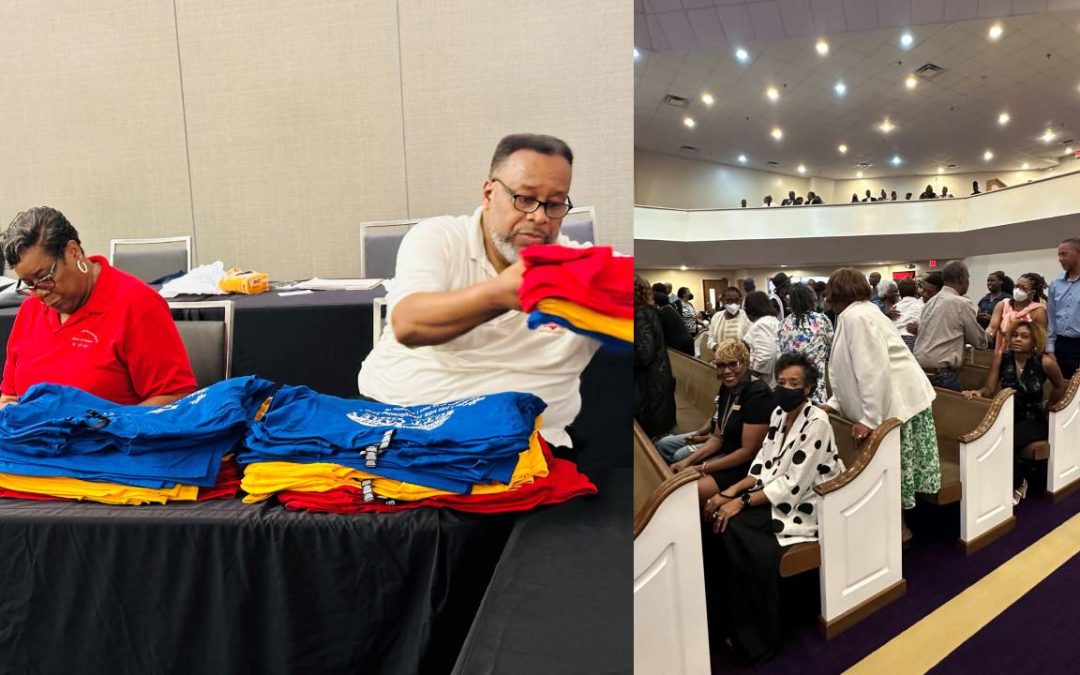
by Eron Henry | Aug 22, 2024 | News
Lott Carey extends heartfelt thanks and gratitude to Rev. Dr. Gina M. Stewart, Christ Missionary Baptist Church, and the city of Memphis for the warm welcome and hospitality during the 127th Lott Carey Annual Session held from August 12-15 at the Renasant Convention Center.
Christ Missionary Baptist Church, the host church whose pastor is Dr. Stewart, provided much love and assistance, including scores of volunteers who served as ushers, greeters, registrants, etc., as well as providing transportation services.
The city of Memphis enabled the more than 900 participants from across the United States and overseas to worship, fellowship, learn, and network in a comfortable setting and ambiance.
Dr. Stewart, who was coming to the end of her three-year term as Lott Carey president, was the consummate host. She pulled out all the stops and for this Lott Carey is deeply grateful. Her commitment and dedication to Lott Carey is unquestioned and we are delighted that her goal of millions for missions was realized. In response, many churches gave generous donations in addition to substantial gifts from Alfred Street Baptist Church in Alexandria, Virginia, and Compassion International.
We note that through her initiative, Dr. Stewart raised $50,000 from pastors and churches in the city of Memphis alone. These funds will go directly to Lott Carey global partners to meet specific needs in Guyana, Haiti, Jamaica, Kenya, and South Africa.
“The event was a resounding success, marked by inspirational worship, rich fellowship, wonderful learning experiences, significant contributions and impactful initiatives,” said Executive Secretary-Treasurer Rev. Emmett Dunn. “Lott Carey is deeply grateful to Dr. Stewart, Christ Missionary Baptist Church, and the city of Memphis for their unwavering support and hospitality during the Annual Session. Their welcome, hospitality and contributions have significantly advanced Lott Carey’s mission and impact globally.”
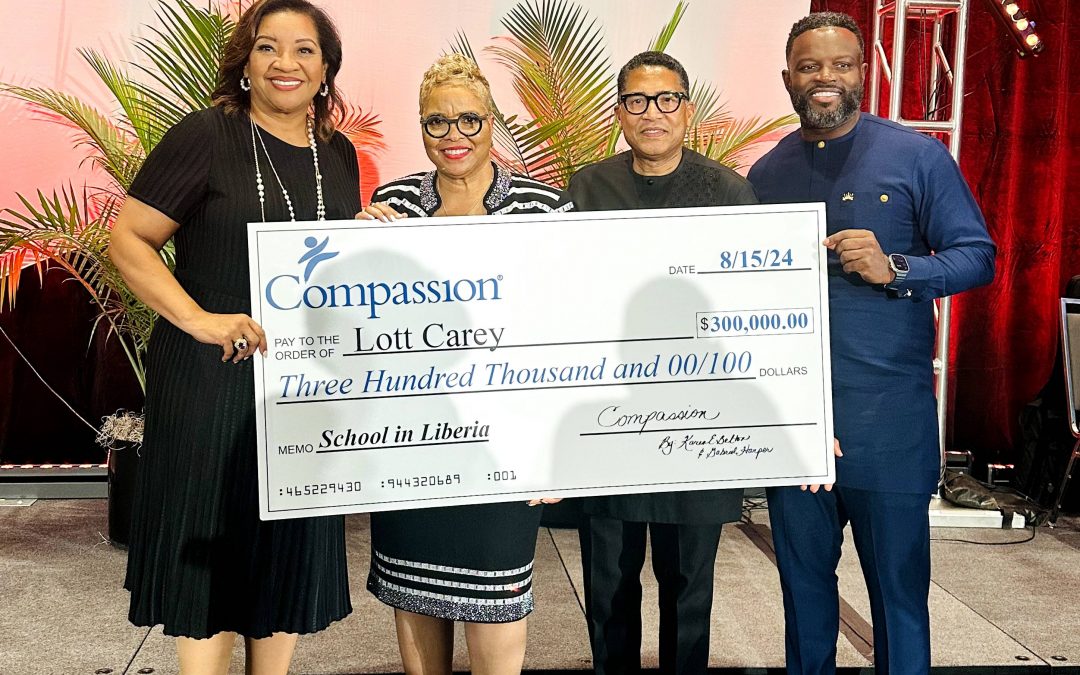
by Eron Henry | Aug 20, 2024 | News
During the 127th Lott Carey Annual Session held in Memphis, TN, from August 12-15, Compassion International made a significant contribution of $300,000 toward the construction of the David and Pamela Goatley High School in a village near Bopolu, Liberia. This generous donation marks a pivotal moment in the ongoing efforts to enhance educational opportunities in this region of the West African country.
Lott Carey has a longstanding commitment to education in Liberia, dating back to 1903. The organization operates in two key communities: Brewerville, located approximately six miles from Monrovia, and an outlying village of Bopolu, three hours’ drive from the national capital. The Brewerville campus serves 330 students from kindergarten through twelfth grade, while the Bopolu campus currently caters to about 225 students from kindergarten to ninth grade.
Bopolu, the capital city of Gbarpolu County, is situated 100 kilometers north of Monrovia and has a population of 95,000. The local community where the school is located primarily consists of subsistence farmers and traders, with Islam being the predominant religion. The Lott Carey Mission Bopolu campus serves students from a five-mile radius, but the nearest high school is 15 miles away, making it inaccessible and unaffordable for many students.
As a result, students who complete the ninth grade have limited opportunities to continue their education. The establishment of a high school in Bopolu will provide these students with the chance to complete their secondary education, significantly improving their prospects and those of their community. The new high school will offer both vocational and academic programs, preparing students to become productive members of society.
The original vision of the Lott Carey founders was to provide quality education to the children and residents of Liberia in a wholesome Christian environment. This vision remains strong today, as the combination of quality education and Christian values has proven to be an effective way to nurture young people into becoming productive citizens.
Parents and elders of Bopolu have long desired the elevation of the school to a high school level. The school is already rated as one of the best in Gbarpolu County, and the addition of a high school will further enhance its reputation and impact.
The $300,000 from Compassion International is the second major donation that Lott Carey received during the Annual Session. The Alfred Street Baptist Church in Alexandria, VA, had earlier presented a $1 million check to support the Ghana Baptist Freedom Initiative to rescue and rehabilitate young girls from the Trokosi system, a traditional practice where girls are enslaved to atone for the sins of their relatives. Among other things, the Alfred Street gift will support the operation of eight existing schools and build additional schools in areas where the Trokosi system is practiced.
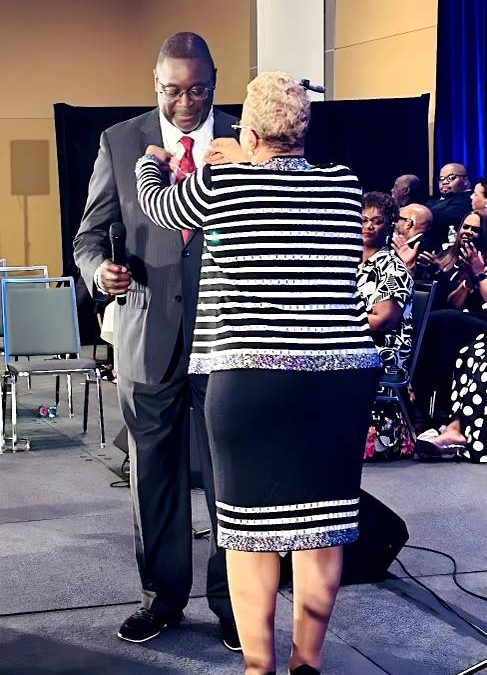
by Eron Henry | Aug 16, 2024 | News
Rev. Dr. Jesse T. Williams, Senior Pastor of Convent Avenue Baptist Church in Harlem, New York, has been installed as the new president of Lott Carey during the 127th Lott Carey Annual Session held August 12-15 in Memphis, TN.
He succeeds Rev. Dr. Gina M. Stewart, after serving as first vice president for three years and, before then, as second vice president, also for three years.
Dr. Williams’ involvement with Lott Carey began through his pastoral role at Convent Avenue Baptist Church, which has a long-standing association with the organization. He recalls, “We have an annual Lott Carey Day where the executive secretary-treasurer comes to preach for us every year, a tradition dating back decades.”
He is the fourth pastor of the church and the second to serve as Lott Carey President. Rev. Dr. Mannie L. Wilson, pastor of the church from 1961 until his passing in 1982, previously served as president of Lott Carey.
This engagement led Dr. Williams to attend Lott Carey annual sessions and eventually join the board, progressing through leadership roles to his current position as president.
Born in Akron, OH, Dr. Williams pursued his education in Kansas and began his ministry in Saint Louis, MO, where he was ordained and served his first congregation, Washington Tabernacle Missionary Baptist Church, for 16 years. He holds a Master of Divinity and a Doctor of Ministry degree from Eden Theological Seminary. His passion for ministry and mission was significantly influenced by Dr. Ronald Bobo, his ordaining pastor, who instilled in him a strong commitment to foreign missions.
Dr. Williams emphasizes the transformative power of mission work, aligning with Lott Carey’s motto of touching lives with the transforming love of Jesus Christ. He aims to highlight how mission transforms people, communities, and nations. “My tenure will emphasize transformation that happens through mission,” he states.
Balancing his pastoral duties with his new role, Dr. Williams acknowledges the challenges but also sees it as a blessing. He believes in empowering his congregation to carry on ministry work, ensuring that the church’s mission continues even when he is engaged with Lott Carey responsibilities.
Dr. Williams plans to prioritize recruitment of new churches and pastors, individual giving, and expanding Lott Carey’s presence in the South, Midwest, and West in the United States. He is committed to maintaining the organization’s integrity and transparency, ensuring that donations are effectively utilized for mission work.
He hopes to leave a legacy of transformative ministry, benevolent giving, and advocacy for justice. He expresses his gratitude to the Lott Carey family for entrusting him with this responsibility and pledges to serve faithfully, praying for continued support and collaboration.
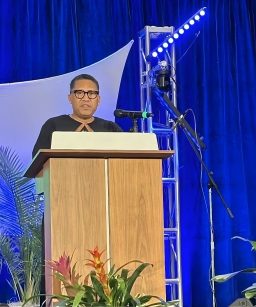
by Eron Henry | Aug 15, 2024 | News
In his report to the 127th Lott Carey Annual Session held in Memphis, Tennessee, from August 12-15, Executive Secretary-Treasurer Rev. Emmett Dunn highlighted collective efforts in advancing the cause of Christ through global missions.
The construction of wells in Sierra Leone and Nigeria provided clean and accessible water to thousands, significantly improving public health and reducing the burden on women and children who previously had to travel long distances to fetch water. In Kenya, several churches were built, creating spaces for worship and community gathering. These churches serve as centers of community development, offering various programs to support local needs.
Recognizing the challenges faced by economically disadvantaged communities, a program to provide shoes for school children was initiated. This effort enabled hundreds of children to attend school with dignity and comfort, removing a significant barrier to their education. Additionally, essential healthcare services were provided through medical assistance programs in Kenya, addressing critical health needs and offering hope and healing to those with limited access to medical care.
In the United States, the focus was on building capacity among churches through the Thriving Congregation Program, providing resources needed to grow and sustain vibrant ministries. Significant financial resources were provided to churches in Nigeria, India, and Kenya, supporting initiatives like church construction, community development, and outreach programs, thereby strengthening partnerships and expanding global impact.
Rev. Dunn emphasized the critical role of the Christian church in addressing the world’s pressing needs amidst economic disparities, social unrest, political instability, and environmental crises. Global socioeconomic and political climate profoundly impacts communities, with millions living in poverty and lacking access to basic necessities. Political conflicts and instability have displaced millions, creating a refugee crisis that demands compassion and action. Social issues such as racism, gender inequality, and the erosion of traditional values further exacerbate these challenges. In this context, the church must reaffirm its role in engendering hope, justice, and peace, addressing both the spiritual and physical needs of people.
Engaging youth and young adults is crucial to the future of the church. This generation is passionate about social justice, equality, and meaningful change. The church must create spaces where young people can connect their faith with action, providing opportunities for them to lead and participate in mission work. This includes offering mentorship, leadership development, and platforms for youth to express their creativity and passion for the gospel.
To strengthen the mission of Lott Carey globally, it is essential to expand partnerships with local and international organizations that share the mission. Collaborative efforts can amplify impact, pooling resources and expertise to address complex global challenges more effectively.
Prioritizing projects that promote long-term, sustainable development in the communities served, including environmental stewardship, is crucial. Increasing advocacy efforts on issues such as poverty, inequality, and human rights can influence policy and bring about systemic change that aligns with Christian values. Investing in discipleship and theological education to equip believers with a deep understanding of their faith and its implications for mission will help cultivate a mission-minded community rooted in scripture and committed to living out the gospel in every aspect of life.
Rev. Dunn reflected on the importance of actions in defining identity. Actions speak louder than words, reflecting true values and priorities. Consistency between belief and action is crucial for integrity, and actions have a profound impact on the world. Understanding that “what you do is who you are” challenges us to live intentionally, examining actions and aligning them with values. This transformation involves allowing God’s Word and Spirit to shape values and, in turn, actions.
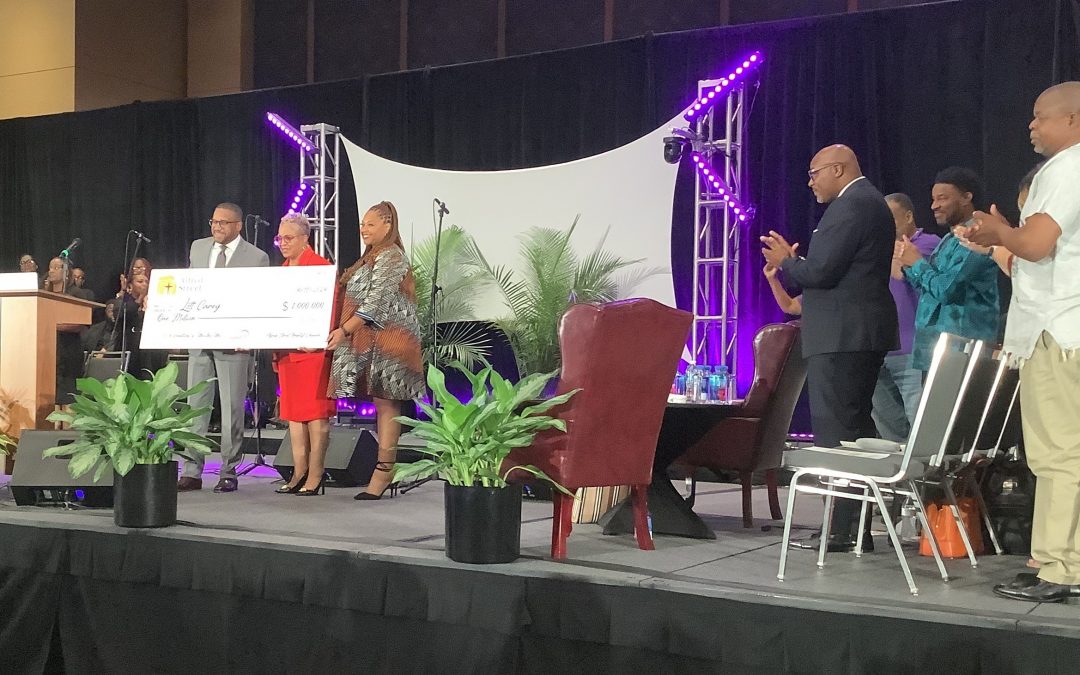
by Eron Henry | Aug 14, 2024 | News
In a significant act of generosity, the Alfred Street Baptist Church in Alexandria, Virginia, has donated $1 million to Lott Carey to support the Ghana Baptist Freedom Initiative. The donation was presented by Senior Pastor Rev. Dr. Howard-John Wesley and Rev. Marcia M. Norfleet, Assistant to the Pastor for Missions, to Lott Carey President Dr. Gina M. Stewart during the 127th Lott Carey Annual Session, held from August 12-15 in Memphis, Tennessee.
The Ghana Baptist Freedom Initiative, in collaboration with the Ghana Baptist Convention, aims to rescue and rehabilitate young girls from the Trokosi system, a traditional practice where girls are enslaved to atone for the sins of their relatives. The initiative, established more than 25 years ago, has successfully rescued hundreds of girls, providing them with education and vocational training to reintegrate into society.
The project, in consultation with the Ghana Baptist Convention, will focus on several key areas. It will support the operation of eight existing schools and build additional schools in areas where the Trokosi system is practiced. These schools aim to educate young girls and introduce them to Christian values, helping them understand the negative impacts of the Trokosi practice. Additionally, the vocational center provides life skills training in basket weaving, sewing, baking, and more. The facility will be rehabilitated to meet current demands, ensuring that rescued girls can become self-sufficient entrepreneurs.
A microfinancing program will offer loans to those who have completed vocational training, enabling them to start or expand their businesses. This financial support aims to lift families out of poverty and improve their standard of living. The Freedom Fund will ensure that resources are available to free more girls from the Trokosi system, with the cost of freeing one person being $500.
The funds donated by Alfred Street Baptist Church will be managed by Lott Carey’s special project account. Distribution will be based on budgetary allotments agreed upon by the Ghana Baptist Convention and Lott Carey.
The project will be overseen by the Office of the Executive Secretary-Treasurer/CEO of Lott Carey, in consultation with the Office of the Executive President (CEO) of the Ghana Baptist Convention. The management plan includes defining project scope, establishing timelines, identifying key roles, and ensuring regular communication and financial transparency.
It is expected to commence in the second half of 2024 and conclude in December 2028.
The funds were received from Alfred Street members who participated in the church’s annual fast, Seek 24. Members donated the cost from which they abstained during the fast, including food, leisure activities, entertainment, etc.
This generous donation from Alfred Street Baptist Church marks a significant step in the fight against the Trokosi system, offering hope and a brighter future to many young girls in Ghana.
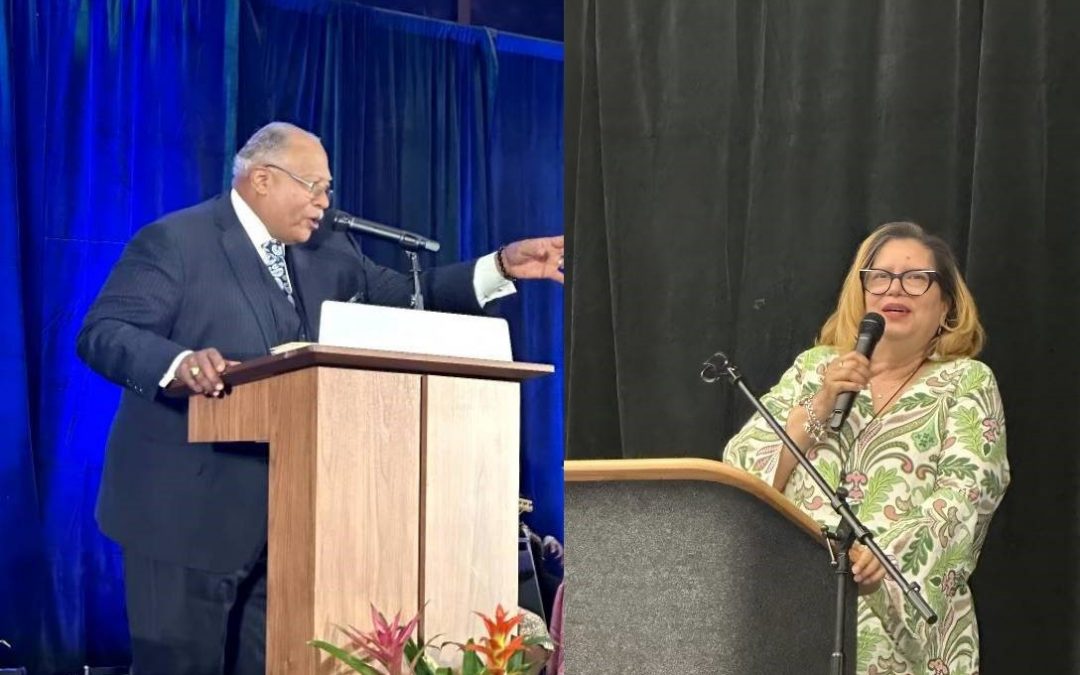
by Eron Henry | Aug 13, 2024 | News
At the official opening of the 127th Lott Carey Annual Session in Memphis, Tennessee, Rev. William F. Wright, Jr., Senior Pastor of the New Zion Missionary Baptist Church in Greensboro, North Carolina, reminded the gathering that there are times “When Silence is Not Golden.”
Rev. Wright argued that there are times when silence is a betrayal, emphasizing that in the face of racism, human rights violations, and community violence, our voices are demanded. He drew parallels between the challenges faced by marginalized communities today and the story of four lepers on the outskirts of Jerusalem as depicted in 2 Kings 7. These men, ostracized and facing a life-threatening crisis, had to make a difficult decision. They chose action over inaction, a choice that strikes a chord with those who feel silenced, marginalized, or hopeless today.
He told the more than 900 persons present that even when we are trying to figure things out, God is already working it out. He encouraged them to step out in faith, assuring them that good things often happen while we are on our way.
The transformation of the lepers was one of hope and redemption. Upon entering the Syrian camp, the lepers found that God had already prepared for their arrival. However, as they began to enjoy their newfound wealth, they realized they could not remain silent about their blessings. They felt compelled to share the good news, a reminder for us to use our blessings to bless others.
Rev. Wright urged the Lott Carey Annual Session attendees to remember where God has brought them from and to use their blessings to bless others. He reminded them that life cannot just be about oneself and that we must consider the needs of others. He encouraged them to embrace a greater call and to allow their transformation to take place.
At a Lott Carey Mission Prayer Breakfast held earlier in the day on August 12, Dr. Cynthia Turner Wood, Senior Pastor of Dayspring Community Church in Maryland, spoke of the divine grace that guides our lives and the importance of acknowledging God’s role in our achievements.
“Let us remember that it is not by our own hand that we are saved, but by the grace of God.” She emphasized that we should not take any glory for ourselves, and introduced the concept of the “God factor,” a term she uses to describe the divine influence that transcends our human limitations. This factor commands us to look at the world through God’s eyes, to envision what can be rather than focusing on the tangible limitations of our lives. She reminded us that we serve a God whose power is limitless and whose presence is assured in our lives.
Dr. Wood highlighted the creativity of God, who designed both the majestic peacock and the humble pigeon. She pointed out that God blessed us with two eyes and two ears, but only one mouth, so that we can see and hear twice as much as what we say. This, she suggested, is a reminder to listen and observe more than we speak.
She drew upon the biblical story of Gideon. When God called Gideon into battle, Gideon organized an impressive army of 32,000 men. But God told Gideon, “You have too many people with you to defeat the Midianites.” This is a reminder that success does not always look like we expect it to. It is a call to let go of our preconceived notions of victory and to trust in God’s plan.
Dr. Wood’s message was particularly poignant for pastors of small churches. She acknowledged the aspirations many have to grow their congregations but reminded them that size does not determine impact.
The Lott Carey Annual Session is held August 12-15 at the Renasant Convention Center in Memphis.











Recent Comments